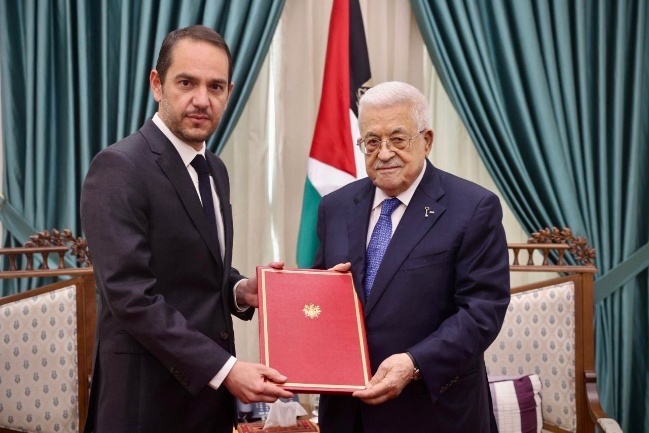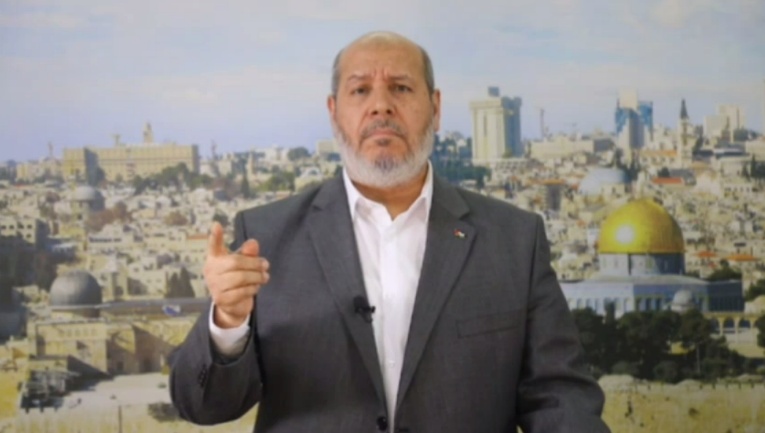 Khalil al-Hayya (al-Aqsa TV, July 27, 2025)
Khalil al-Hayya (al-Aqsa TV, July 27, 2025)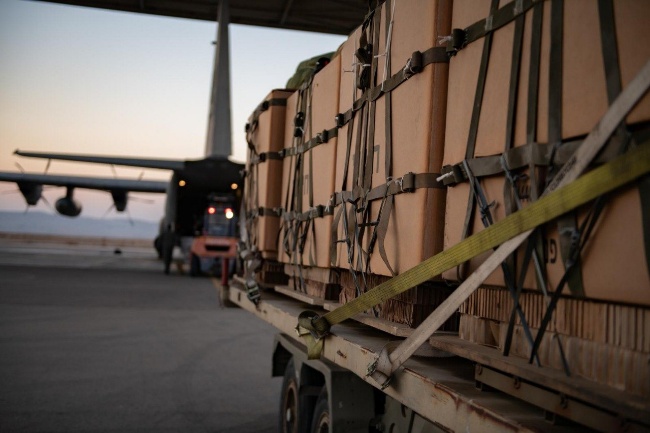 Israeli Air Force preparations for airdropping humanitarian aid (IDF spokesperson, July 27, 2025).
Israeli Air Force preparations for airdropping humanitarian aid (IDF spokesperson, July 27, 2025).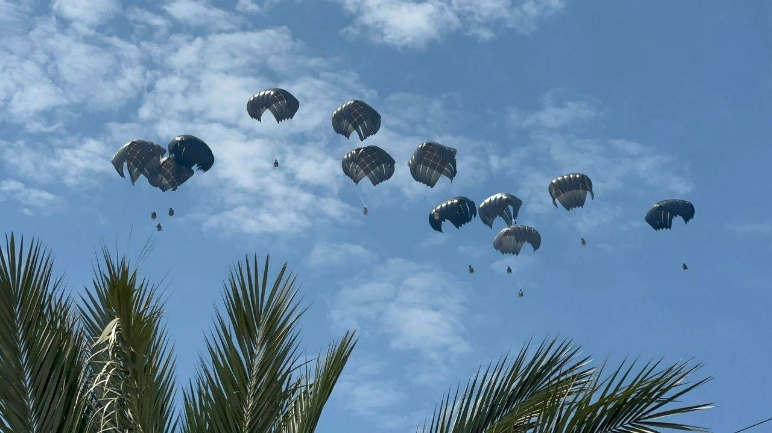 UAE airdrop (Arab Defense X account, July 28, 2025)
UAE airdrop (Arab Defense X account, July 28, 2025)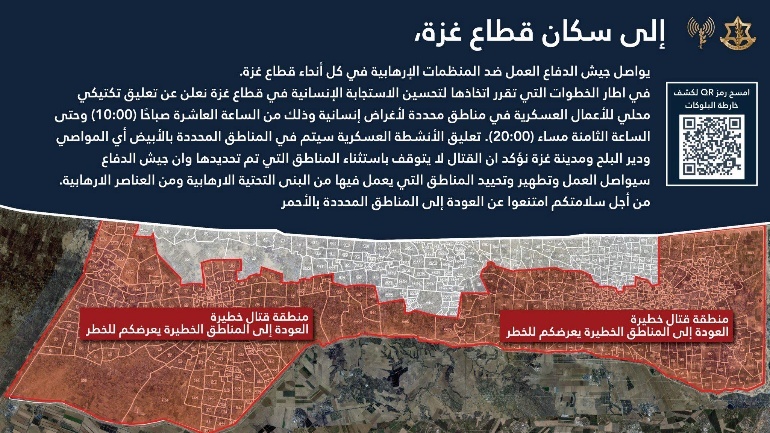 Map of the tactical ceasefire areas (COGAT, July 27, 2025)
Map of the tactical ceasefire areas (COGAT, July 27, 2025)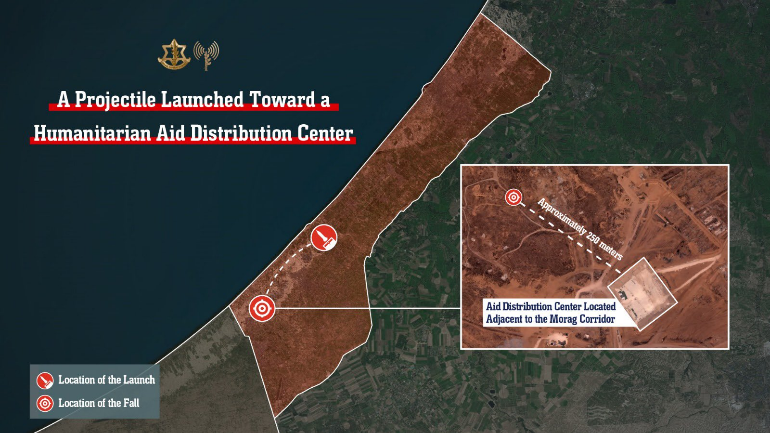 Map of the rocket launch targeting the aid distribution compound (IDF spokesperson, July 24, 2025)
Map of the rocket launch targeting the aid distribution compound (IDF spokesperson, July 24, 2025)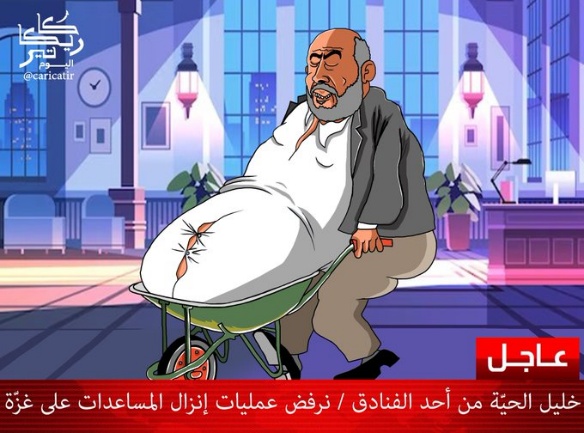 Cartoon by Saudi cartoonist Fahd al-Jabiri. Khalil al-Hayya in one of the hotels says, “We reject the aid airdrops in Gaza” (Fahd al-Jabiri’s X account, July 28, 2025)
Cartoon by Saudi cartoonist Fahd al-Jabiri. Khalil al-Hayya in one of the hotels says, “We reject the aid airdrops in Gaza” (Fahd al-Jabiri’s X account, July 28, 2025)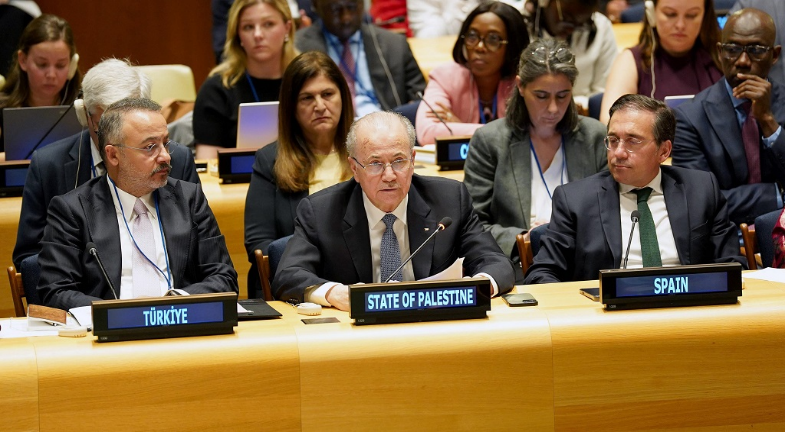 Muhammad Mustafa delivers a speech at the conference (Wafa, July 28, 2025)
Muhammad Mustafa delivers a speech at the conference (Wafa, July 28, 2025)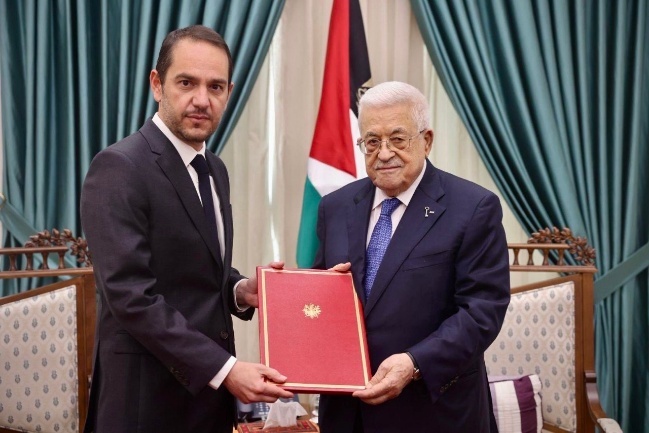 The French consul gives Mahmoud Abbas the letter (French foreign minister’s X account, July 24, 2025)
The French consul gives Mahmoud Abbas the letter (French foreign minister’s X account, July 24, 2025)
- IDF forces continued widespread aerial and ground attacks on terrorist targets in the Gaza Strip and eliminated Hamas terrorist operatives. Three IDF soldiers were killed in the fighting. Hamas raised its level of alert, fearing of an Israeli operation to rescue hostages.
- Hamas claimed “surprise” after the American administration accused it of not being willing to reach a ceasefire agreement despite the mediators’ efforts. The movement reiterated its claim that it had shown “flexibility” and its desire to end the war. Khalil al-Hayya, Hamas leader in the Gaza Strip, said there was no point in continuing the talks under the “attack, destruction and hunger” of the Palestinians in the Strip, and angered Egypt and Jordan after he accused them of not doing enough and called on their citizens to march toward “Palestine.”
- The IDF initiated a series of measures to improve the humanitarian response in the Gaza Strip, including airdrops and opening humanitarian corridors. Nevertheless, Hamas continued to promote the false narrative of “deliberate hunger” and blamed “collaborators with Israel” for looting aid trucks.
- IDF forces took peaceful control of the ship Handhala, which tried to reach Gaza with about 20 foreign activists.
- Eight soldiers were injured in a vehicular ramming carried out by an Arab-Israeli terrorist near Kfar Yona. Stabbings were prevented in the communities of Migdal Oz and Shim’a. The terrorist who planted explosives on buses in the Dan region in February 2025 was detained.
- The UN conference for a two-state solution sponsored by France and Saudi Arabia began in New York. The Palestinian Authority prime minister said they aspired to establish an independent and democratic state which would live in peace alongside Israel. The Palestinians welcomed the French president’s announcement that France would recognize a Palestinian state.
The IDF
- IDF forces continued air and ground operations in the Gaza Strip. They attacked hundreds of terrorist targets, primarily those of Hamas and the Palestinian Islamic Jihad (PIJ), some of which operated from civilian buildings. Terrorist squads and operatives were attacked, including the head of the counterespionage directorate in the Hamas general security forces and a Hamas operative involved in smuggling weapons. Buildings used for military purposes, weapons depots, tunnels and underground facilities, rocket launch and sniper positions, explosive sites and other terrorist facilities were also attacked. Two IDF soldiers were killed by an explosive device in the south of the Strip and another soldier died of his wounds after being injured a few days earlier. Five soldiers were seriously injured (IDF spokesperson, July 22–29, 2025).
- Warned by Israeli and American officials that alternative ways of returning the hostages would be explored because of the stalemate in negotiations, an officer in the Hamas “resistance[1] security forces” claimed Israel planned to carry out an operation to release the hostages. According to “the officer,” all the units securing hostages raised their alert level, and a “immediate elimination” protocol[2] was activated in the event of an Israeli intrusion (Telegram channel al-Akhres, July 25, 2025). Meanwhile, a “senior figure in the Hamas military wing” said they had intelligence regarding Israel’s intention to release the hostages, and stated that all units of the Izz al-Din al-Qassam Brigades [the Hamas military wing] had been instructed to deal with the hostages as they saw fit if an Israeli intrusion occurred, stressing that the release of the hostages would only be possible within the framework of a deal which end the “suffering” in the Gaza Strip (al-Ziyad Telegram channel, July 26, 2025). “Resistance security” also expressed fear of attempts to assassinate or kidnap senior figures outside the Strip and called on “resistance” operatives abroad to increase their precautions (al-Ziyad Telegram channel, July 26, 2025).
Rocket Fire
- On July 26, 2025, a rocket was launched from the southern Gaza Strip at the Kissufim area and fell in an open area. There were no casualties (IDF spokesperson, July 26, 2025).
- On July 24, 2025, Hamas delivered its response and that of the Palestinian “factions”[3] to the proposal for a sixty-day ceasefire. “Palestinian sources” reported that Hamas had submitted an updated response after the mediators rejected the initial version and demanded revisions. It was also reported that the Palestinian “factions,” which had held consultations with Hamas, opposed Hamas’ lack of flexibility regarding the ceasefire and emphasized that it had to take the matter more seriously in order to end the war in the Gaza Strip (Hamas Telegram channel, July 24, 2025; al-Arabiya.net, July 24, 2025).
- After receiving Hamas ‘ response, the Israeli prime minister’s office announced the return of the Israeli delegation from Doha for consultations, stating that it was a coordinated move and did not signal the collapse of the talks (Israeli media, July 24, 2025). However, Steve Witkoff, the United States envoy to the Middle East, said that the Hamas response showed a lack of willingness to reach a ceasefire in Gaza and accused the movement of acting not in good faith but selfishly, despite the mediators’ efforts. He stated that the United States would examine alternative options for the return of the hostages and for stabilizing the situation in the Strip, stressing that the United States was determined to end the conflict and bring permanent peace to Gaza (Steve Witkoff’s X account, July 24, 2025). President Trump was also angry with the Hamas response and said the movement was not truly seeking a deal but “only wanted to die,” and therefore the job had to be completed and Hamas had to be destroyed. He hinted that Israel would need to “clean the area,” and said he was pessimistic about the release of the remaining hostages, claiming that Hamas was keeping the last ones as final bargaining chips (Fox News, July 25, 2025).
- However, a joint statement from Egypt and Qatar reported that “some progress” had been made during the three weeks of indirect negotiations in Doha and that in a complex negotiation it was normal to suspend talks to hold consultations before renewing the discussion. The two countries told the public not to rely on leaks from media outlets trying to minimize the value of the talks and influence the negotiating process, adding that the leaks did not reflect reality (Egyptian foreign ministry Facebook page, July 25, 2025).
- Hamas claimed “surprise” at the American statements and reiterated that movement had shown “flexibility” during the negotiations and was still ready to reach a ceasefire to end the war in the Gaza Strip:
- Hamas claimed the movement had conducted the negotiations with “national responsibility and maximum flexibility” on all issues and had worked “diligently” to reach an agreement that would end the fighting. Hamas said it had given its response after extensive consultations with the Palestinian “factions,” the mediators and friendly countries, with a “positive attitude” toward all the comments it received, and therefore was “surprised” by Witkoff’s “negative statements” regarding its position, just as the mediators had welcomed its “constructive and positive” stance (Hamas Telegram channel, July 25, 2025).
- Izzat al-Rishq, a member of the Hamas political bureau, also claimed to be “surprised” by the statements from Trump and Witkoff, and accused the Israeli government of being the real reason for the failure because of its “evasions and constant undermining.” He said Hamas had responded “positively and flexibly” to all the comments raised in the Witkoff document, noting the need to clarify the clauses related to humanitarian aid and its distribution exclusively through the UN and its agencies, without Israeli involvement. He added that Hamas also wanted to reduce the depth of the buffer zones where the IDF would remain during the sixty-day ceasefire and to keep Israeli forces from densely populated areas to ensure the return of most residents to their homes. Al-Rishq called on the United States to stop supporting Israel and to pressure the Israeli government to act seriously to reach an agreement that would end the war and lead to a prisoner exchange deal (Hamas Telegram channel, July 26, 2025).
- Hamas figure Taher al-Nunu said that the American statements were unjustified in light of the progress made in the negotiations. He added that significant progress had been made on the issue of the Israeli withdrawal maps, and claimed that the issue of “prisoners” which had not yet been discussed, was supposed to be dealt with during the coming week. He said Hamas was prepared to complete the negotiations and was [allegedly] “serious” about reaching an agreement to end the war. He claimed Hamas had not been informed of problems in the negotiations and the recent Israeli statements were an attempt at evasion (al-Arabi Channel website, July 25, 2025).
- Hamas political bureau member Ghazi Hamad claimed that the movement had acted seriously to reach an agreement and their efforts had been welcomed by the mediators. He criticized Witkoff’s remarks, saying the movement had been surprised and had not received an explanation, and that Trump’s statements about eliminating Hamas were illogical and unacceptable. Hamad claimed that Hamas was “never an obstacle to reaching a ceasefire agreement” and claimed the closer they got to an agreement, “the more we see procrastination and military escalation from the occupation.” He added that Israel wanted to continue the war and “destroy the Strip and the resistance,” while Hamas wanted to release as many prisoners as possible within any agreement with Israel. He claimed Hamas wanted to continue the negotiations as a step which would lead to ending the fighting, and was confident that all parties wanted to reach an agreement (al-Arabi TV, July 26, 2025).
- Khalil al-Hayya, the Hamas chief negotiator and head of its political bureau in the Gaza Strip, claimed that for 22 months the “resistance” leadership had done everything in its power to end the “aggression” and had shown every “possible flexibility” which did not contradict the Palestinians’ fundamental principles. He added that progress had been made in the last round of negotiations and that they had largely agreed to everything the mediators presented, especially on the issues of withdrawal, prisoners and entry of aid, and were then surprised by Israel’s and the United States’ “withdrawal” from the negotiations. He claimed the move had been intended to waste time and allow for the continued “killing of Palestinians.” He added that afterward Israel had presented comments on the understandings regarding the management of aid distribution, undermining the role of UN and local organizations. He also said “the enemy” insisted on preserving the aid mechanism, which he claimed had become “death traps,” and also insisted on controlling a large area in Rafah to establish a zone for the displaced, thereby paving the way for the “displacement” of the Palestinians, via Egypt or the sea, and the “elimination” of the Palestinian issue. He said that in light of “the enemy’s” denial of the results of the last round and its use of the negotiations to continue the war, it was pointless to continue the talks (Hamas Telegram channel, July 27, 2025).

Khalil al-Hayya (al-Aqsa TV, July 27, 2025)
- This past week Hamas and its affiliated media continued to push the “deliberate hunger” narrative in the Gaza Strip. The Hamas government media information office in the Gaza Strip claimed that hunger was dramatically worsening, falsely stating that Israel had completely closed the crossings for more than 145 days and had prevented the entry of humanitarian aid and baby formula. The office denied reports of a “breaking of the siege” or large-scale aid deliveries, calling them “lies consistent with the occupation’s propaganda” (Hamas Telegram channel, July 24, 2025). The ministry of health in Gaza provided daily updates on deaths in hospitals in the Strip, which it claimed were caused by malnutrition, asserting that the death toll since the beginning of the war was 147 people, including 88 children (ministry of health in Gaza Telegram channel, July 23–29, 2025).
- Meanwhile UNRWA claimed that one in five children in the Gaza Strip was malnourished, with the number of cases rising daily. UNRWA commissioner general Philippe Lazzarini aid that most of the children arriving for treatment were extremely weak and could die if they did not receive immediate aid. He said that the crisis affected the entire population, including medical staff. He called for the unrestricted entry of humanitarian aid into the Strip, and claimed that UNRWA was waiting for authorization to allow the entry of about 6,000 truckloads of food and medical supplies currently in Jordan and Egypt (Wafa, July 24, 2025).
- In light of growing international pressure caused Hamas promotion of the false “deliberate hunger” narrative, the Israeli government instructed the IDF to take steps to improve the humanitarian response in the Gaza Strip and refute Hamas ‘ claims:
- On the night of July 26, 2025, the Israeli Air Force airdropped seven pallets of humanitarian aid, including flour, sugar and canned goods, in coordination with international organizations (IDF spokesperson, July 26–27, 2025). Subsequently, about fifty more pallets were airdropped by Jordanian and UAE transport aircraft in cooperation with the Israeli Air Force (Israeli Coordinator of Government Activities in the Territories [COGAT] X account, July 26–29, 2025).


Right: Israeli Air Force preparations for airdropping humanitarian aid (IDF spokesperson, July 27, 2025). Left: UAE airdrop (Arab Defense X account, July 28, 2025)
-
- According to the COGAT, during the week ending July 26, 2025, more than 600 aid trucks entered the Gaza Strip through the Kerem Shalom and Zikim Crossings and were distributed by the UN and international organizations. On July 27, 2025, more than 120 aid trucks entered and were distributed, and over 200 more followed the next day, with another 260 trucks awaiting distribution inside the Strip and hundreds more queued for pickup by the UN. In addition, UN fuel tankers were delivered for critical systems (COGAT X account, July 26–29, 2025). Palestinians reported that humanitarian aid convoys were making their way into the Gaza Strip via three main routes: in the south, via the The Egyptian Liaison Committee on Gaza accompanied by a prearranged security force; in the north, via the Jordanian crossing route; and in the center via the Kissufim Crossing. It was also reported that a security unit had been established to supervise the trucks (al-Bureij Telegram channel, July 27, 2025).
- The IDF spokesperson reported a local tactical suspension of military operations for humanitarian purposes, daily from 10:00 to 22:00, in areas where IDF forces were not operating, including al-Mawasi, Deir al-Balah and Gaza City. The suspension was coordinated with the UN and international organizations, and secure humanitarian corridors were designated for aid movement between 06:00 and 23:00 for the distribution of food and medicine. The IDF spokesperson stressed that offensive activity against terrorist organizations would continue (IDF spokesperson, July 27, 2025).

Map of the tactical ceasefire areas (COGAT, July 27, 2025)
- The IDF reconnected the power line to the desalination plant in the southern Strip, increasing the supply of drinking water to 20,000 cubic meters per day (COGAT Facebook page, July 27, 2025). The delivery of fresh water was reported in the northern area of the al-Bureij camp, with assistance from the Friends Without Borders organization and in cooperation with the Popular Committee for Refugees (Telegram channel al-Bureij, July 27, 2025).
- The World Food Programme (WFP) welcomed Israel’s willingness to allow humanitarian pauses and open designated corridors for UN aid convoys delivering food and emergency supplies to the Gazans. The WFP said it had enough food in the area to support the entire population (2.1 million people) for nearly three months. It reported that Israel had committed to improving humanitarian operating conditions, including expediting permits, opening alternative routes, ensuring the movement of convoys without fire, and allowing the use of humanitarian communication equipment. According to the program, since the opening of the crossings on May 21, 2025, 22,000 tons of aid had entered, while the full monthly requirement stands at over 62,000 tons. It alleged that one-third of the population went “for days” without eating, about 470,000 people were living under “famine-like” conditions, and around 90,000 women and children were in immediate need of nutritional treatment (World Food Programme X account, July 27, 2025).
- Even after Israel expanded its humanitarian activity, Hamas continued to promote the “hunger” narrative, claiming the steps were insufficient:
- In a Hamas statement, it was claimed that the airdrops were “deceptive and misleading,” intended to whitewash Israel’s image. It also said this was an attempt to bypass the Palestinian people’s right to end the “siege” and the international community’s demands to stop the “starvation policy” conducted by the Netanyahu government. Hamas added that the Israeli plan for airdrops and humanitarian corridors represents “a policy of managing, endangering and humiliating starvation,” not ending it, aimed at forcibly imposing facts on the ground under “the fire of bombings and hunger,” and that it endangers civilians” instead of providing them protection and comprehensive aid. Hamas emphasized that the only way to end the “hunger” in the Gaza Strip was to stop the “aggression,” break the siege imposed on it, fully and permanently open the land crossings for humanitarian aid, and ensure its flow and delivery to civilians according to UN mechanisms (Hamas Telegram channel, July 27, 2025).
- Khalil al-Hayya, head of the Hamas political bureau in the Gaza Strip, said he opposed the airdrops in the Gaza Strip and claimed they were “propaganda aimed at covering up the occupation’s crimes in the Gaza Strip.” He added that the entry of aid was an expression of seriousness regarding the continuation of negotiations, but “we will not accept that our people be bargaining chips in the occupation’s negotiations.” He also called on Arab and Muslim countries to sever their ties with Israel and on Muslims to march to “Palestine,” besiege “enemy” embassies and pursue its soldiers. In particular, he appealed to residents of Jordan and urged them to continue the “popular awakening” and move toward “Palestine,” and called on Egypt to intervene and not to agree to the closure of the Rafah Crossing and the “expulsion” of Palestinians (Hamas Telegram channel, July 27, 2025). In response, “Jordanian sources” condemned al-Hayya’s remarks, calling them “provocative” and adding that the Jordanian people did not take instructions from the leaders of Palestinian “factions.” They emphasized that Jordan would continue to provide aid to the Strip and would not agree to politicize the issue (Sky News Arabia, July 28, 2025). Egyptian journalists close to the regime also expressed anger at al-Hayya. Journalist Osama Dalil accused al-Hayya of trying to speak on behalf of the Gaza Strip while not being there but rather “in an air-conditioned room in another country” and called on Hamas to lay down its weapons to end the war (al-Arabiya, July 27, 2025).

Cartoon by Saudi cartoonist Fahd al-Jabiri. Khalil al-Hayya in one of the hotels says, “We reject the aid airdrops in Gaza” (Fahd al-Jabiri’s X account, July 28, 2025)
-
- Hamas figure Mahmoud Mardawi claimed that Israel and the IDF’s announcement, under international pressure, of the resumption of aid airdrops and the establishment of temporary humanitarian pauses was not a solution but a late and roundabout admission of a “crime.” According to him, “starvation” was a systematic policy, and He claimed Israel was now trying to rehabilitate its image, not to save the lives of Palestinian civilians. He said the position taken by Israel was [allegedly] “an admission of using hunger as a weapon.” He said Israel would not escape punishment and would pay for “its heinous acts” (Mahmoud Mardawi’s Telegram channel, July 27, 2025).
- The Hamas government media information office claimed that dozens of aid trucks which had entered the Gaza Strip were looted by “armed groups [allegedly] operating under Israeli cover” and that the airdropped aid landed in dangerous combat zones where civilians had no access, and therefore the measure was useless. The office claimed Israel and the United States were responsible and accused the international community of “colluding against the hungry residents of the Gaza Strip through false promises or misleading information” (Hamas government media information office Telegram channel, July 27–28, 2025).
- The National Association of Palestinian Tribes, Clans and Families announced that the humanitarian aid convoys arriving from the Zikim area would be secured under the personal supervision of tribal elders, mukhtars and community activists to ensure their safe arrival to those in need in the Gaza Strip. The association warned against attempts by looters or “collaborators with Israel” to attack the convoys and said “a heavy hand” would be used against them. A call was also issued to all tribes to restrain their youth, assume national and moral responsibility, and prevent anarchy which could serve the interests of “the occupation” (al-Aqsa TV, July 27, 2025).
- In response to the Hamas accusations that the looters operated under Israeli cover, the IDF spokesperson released footage dated July 25, 2025, showing armed Hamas operatives violently looting humanitarian aid transferred to the Gaza Strip and preventing its distribution to the civilian population. According to the IDF, they were terrorist operatives, not security personnel acting to prevent looting, as Hamas claimed. The IDF emphasized that even when aid was transferred to the Gaza Strip, Hamas seized it for itself, ignoring the needs of the civilians, and that the footage proved Hamas was the central factor preventing aid from reaching the population (IDF spokesperson, July 29, 2025)
The Humanitarian Aid Distribution Centers
- On July 24, 2025, the IDF identified a rocket launch from the Khan Yunis area targeting the humanitarian aid distribution complexes in Rafah, and it reportedly hit approximately 250 meters from a compound near the Morag Axis. Nevertheless, the compound opened as planned and tens of thousands of food packages were delivered to families. The IDF spokesperson said it was a continuation of the terrorist organizations’ brutal attempts to disrupt the activity of humanitarian aid distribution, which was carried out by the American company and international aid organizations, with the objective of preventing the supply of food to the civilian population in the Gaza Strip (IDF spokesperson, July 24, 2025).

Map of the rocket launch targeting the aid distribution compound
(IDF spokesperson, July 24, 2025)
- A BBC Verify Live report which examined the contents of the humanitarian foundation for Gaza (GHF) aid cartons distributed in the Gaza Strip since the end of May 2025, found that the boxes contained mainly dry food such as flour, lentils, chickpeas, pasta oil, and a few halva snacks, but did not provide balanced nutrition. While the foundation claims each box provides approximately 42,500 calories, supposedly sufficient for 5.5 people for three and a half days, experts claim the boxes provide only basic calories and may cause hidden undernourishment and diseases such as anemia and scurvy. According to the report, the boxes lack essential vitamins and minerals and are not particularly suitable for children and pregnant women. In addition, due to the severe shortage of fuel and water, residents have difficulty cooking the food and are forced to use waste materials as fuel (BBC, July 26, 2025).
Hamas Governance
- Yasser Abu Shabab, leader of the Popular Forces militia in eastern Rafah, which enjoys Israeli support, published an op-ed in the Wall Street Journal in which he claimed that the overwhelming majority of Gazans rejected Hamas and called on the international community to recognize an independent, non-ideological Palestinian administration under his leadership. He said his group currently controlled a large area in eastern Rafah and effectively managed a safe zone separate from Hamas influence, where Gazans lived with access to food, water, shelters, and basic medical services, without fear of bombings, looting, or harassment by Hamas. Abu Shabab added that he led a pragmatic force whose goal was to separate innocent civilians from the cycle of violence between Hamas and Israel and his group had succeeded in removing Hamas presence from the area, allowing eastern Rafah residents to enjoy a relatively safe routine of life with a dramatic improvement in their personal security. He revealed that he lost his brother and cousin to Hamas gunfire after they tried to obtain aid for their family and the incident had led him to end his silence. He added that despite their widespread hatred for Hamas, most Gazans were still afraid to speak out publicly against it, after activists who protested its rule were murdered, tortured or disappeared. Abu Shabab called on the United States and Arab states to officially recognize the Popular Forces and help them build a new governing alternative in the Strip, providing economic support, humanitarian aid and corridors for safe movement (Wall Street Journal, July 24, 2025).
- “Security sources in the resistance” reported that the IDF had recently established a new “collaborator gang” in the Bedouin village area in the northern Gaza Strip and assigned them tasks aimed at facilitating IDF operations and providing it with direct intelligence. They claimed the gang also had ties with Palestinian Authority security in Ramallah, led by General Intelligence Officer Bahaa’ Balousha. According to “the sources,” several local families realized the danger of the gang’s formation and contacted their involved sons, and an understanding was reached whereby a pardon would be granted to anyone who returned to his family and ceased cooperating with Israel. However, “the sources” noted that a group of up to ten “collaborators” from the gang did not respond to the calls and continued to operate, and that “the resistance” had their names and information that they received direct orders from IDF officers stationed in the area. “The sources” said the collaborators would be treated as IDF soldiers (Quds Network Telegram channel, July 27, 2025).
- The Hamas Ra’ad Force reported that its operatives had executed six collaborators from Yasser Abu Shabab’s militia in Khan Yunis in the field and set fire to a Toyota jeep used by the militia for transport and to carry out “dubious missions in the service of the Zionist enemy” (Ra’ad Force Telegram channel, July 27, 2025).
- Following incidents of violence, bullying, roadblocks and assaults on passersby which took place near the Dream Plus shopping center in Gaza and were linked to youths from the al-Katatwa tribe, Hamas informed the tribe that they and those involved would no longer receive social cover. The tribal leaders and their sons were called upon to withdraw all protection from the rioters, emphasizing that they would otherwise be dealt with directly, firmly and uncompromisingly “to preserve public safety and order.” In addition, anyone convicted of bullying would face severe punishment through immediate on-the-spot enforcement (Amsak Amil Telegram channel, July 28, 2025).
International Activity “to Break the Siege” of the Gaza Strip
- On the night of July 26, 2025, IDF fighters peacefully took control of the ship Handhala in the Mediterranean Sea, en route to the Gaza Strip with 21 passengers on board, including American and French citizens. The ship tried to illegally enter the maritime area off the coast of Gaza, was transferred to Ashdod Port and the activists were deported back to their countries (Israeli foreign ministry and media, July 27, 2025). Hamas strongly condemned the IDF takeover of the ship and called it a “terrorist crime and act of piracy” showing gross contempt for the “will of humanity.” Hamas claimed the ship was intended “to break the siege on hungry and besieged Gaza” and that the “kidnapping” of its passengers was part of a directed attack on the Strip’s residents. Hamas praised the “courage” of the international volunteers and claimed their message of solidarity had reached the world (Hamas Telegram channel, July 27, 2025). The Popular Front for the Liberation of Palestine (PFLP) also strongly condemned the seizure of the boat and claimed it demonstrated the complicity of the international system. The PFLP called the ship’s crew “guardians of the human conscience” who managed to achieve a moral victory despite the takeover (Shehab Telegram channel, July 27, 2025).
The al-Sinwar Family Fled to Turkey
- “A source in Gaza” reported that Samar Abu Zamer, widow of late Hamas leader Yahya al-Sinwar, “the butcher of Gaza,” fled the Gaza Strip to Turkey with her children using a forged passport with sophisticated logistical support and significant financial backing. According to “the source,” she remarried in Turkey with the mediation of senior Hamas official Fathi Hammad, who was involved in smuggling Hamas operatives out of the Gaza Strip. “The source” added that Najwa, the wife of former military wing head Muhammad al-Sinwar, also left the Strip with her children even before her husband’s elimination in May 2025, apparently to Turkey. “Israeli security sources” confirmed that both women exited via the Rafah Crossing before their husbands were killed (YNET, July 23, 2025). The Hamas-affiliated al-Siyad Telegram channel called the report a lie and claimed its objective was to collect information about al-Sinwar’s wife and children in order to harm them (al-Siyad Telegram channel, July 24, 2025).
- Fatah attacked Hamas and accused it of turning its back on the Palestinian national interest and being involved in regional projects which contradicted the national liberation movement of the Palestinian people. Fatah said Hamas had rejected every framework for unity or national agreement and its conduct provided Israel with excuses to continue “its crimes in the Gaza Strip and the West Bank.” Fatah claimed that Hamas controlled national decision-making and ignored chairman Mahmoud Abbas’ initiatives to end the fighting while surrendering to regional ties which did not represent the Palestinian aspiration to establish an independent state. Fatah noted Mahmoud Abbas’ call for Palestinian National Council elections out of a commitment to democracy and national unity and accused Hamas of having prevented elections in the Strip since the 2007 coup and refusing to join the PLO or recognize its international obligations. In conclusion, Fatah said that the Palestinian people would continue to struggle alongside its leadership against “annexation and expulsion” plans until it achieved its historical and national rights (Fatah Facebook page, July 24, 2025).
- Ahmed Majdalani, a member of the PLO Executive Committee, accused Hamas of worsening the national crisis with its reckless military policy and blaming external parties instead of taking responsibility for the disaster that befell the Palestinian people. He said that instead of drawing conclusions from the Gaza Strip tragedy and formulating a policy within a united national framework, Hamas continued to act based on narrow partisan interests. He condemned the Hamas statements about Egypt and Jordan and called them irresponsible, the consequence of a loss of political compass. He said that those two states were strategic depth for the Palestinian people and strongly opposed “expulsion” plans and without them the situation would have deteriorated even further (Wafa, July 28, 2025).
- Muhammad Mustafa, Palestinian Authority prime minister, said in his speech at the United Nations conference in New York on the two-state solution that the PA was prepared to take full responsibility for governance and security in the Gaza Strip, including cooperation with temporary Arab and international forces under UN supervision. Mustafa called on Hamas to hand over its weapons and on Israel to end the “occupation” and its policy of “collective punishment” (Wafa, July 29, 2025).
Terrorist Attacks
- Vehicular attack near Kfar Yona: On July 24, 2025, an Arab-Israeli terrorist rammed into a group of IDF soldiers at a bus stop at the entrance to Kfar Yona, in central Israel near the Beit Lid junction. Eight soldiers were injured, two of them seriously (IDF spokesperson and Israeli media, July 24, 2025). The terrorist, a 27-year-old man from Taybeh, fled the scene and security forces launched a manhunt. He was detained three days later (Israel Police spokesperson, July 26, 2025).
- Attempted stabbing in Migdal Oz: On July 25, 2025, a Palestinian terrorist armed with a knife threw rocks at the entrance gate to the settlement of Migdal Oz in Gush Etzion. He was shot and killed (IDF spokesperson, July 25, 2025).
- Attempted stabbing near the settlement of Shim’a: On July 25, 2025, a Palestinian terrorist armed with a knife attempted a stabbing attack near the settlement of Shim’a in Judea. He was shot and killed (IDF spokesperson, July 25, 2025).
Call for Arson Attacks
- Given the current extreme heatwave, a call was issued for Palestinians to set fire to Israeli communities. The announcement read, “Heroes of the West Bank and Jerusalem, tomorrow is your day, take advantage of the scorching heat and ignite fires everywhere, gasoline and a spark can turn the [Zionist] entity into a hell of fire” (Palestine Now Telegram channel, July 27, 2025). In practice, no unusual incidents were recorded.
Counterterrorism Activities
- This past week Israeli security forces continued counterterrorism activities in Judea and Samaria. The forces detained wanted individuals and terrorist operatives, including the terrorist who carried out the bus bombing attack in Gush Dan in February 202. They eliminated attackers who threw Molotov cocktails, and confiscated explosives and weapons (IDF spokesperson, July 22–29, 2025). Hamas reported the deaths of six Palestinians from IDF gunfire in Judea and Samaria during the week (Hamas in Judea and Samaria Telegram channel, July 22–29, 2025).
The Two-State Solution Conference
- On July 28, 2025, the UN conference to promote the two-state solution began in New York, led by France and Saudi Arabia. Muhammad Mustafa, PA prime minister, headed the Palestinian delegation, accompanied by Foreign Minister Farsin Aghabekian Shahin. They met with the foreign ministers of Spain, Egypt, France, Iraq, Canada and Bahrain, with Lebanese representatives, and with other international figures. Mustafa reportedly reiterated the need for immediate international pressure to end the war in the Gaza Strip, open the crossings and bring in humanitarian aid. He also called to mobilize international support for broader recognition of a Palestinian state and to prepare for a reconstruction conference after the end of the fighting, and promoted an initiative to convene a donor conference, in light of the severe financial crisis resulting, according to him, from Israel’s continued withholding of tax funds (Wafa, July 28, 2025).
- Speaking at the conference, Mustafa said the events in the Gaza Strip were “the most recent expression of the historical injustice done to the Palestinian people.” He called for the withdrawal of IDF forces from the Strip, the release of the hostages and an end to “the suffering of the Gazans.” He also called on more countries to recognize an independent Palestinian state and warned against “the illusion that security can be achieved by exterminating the Palestinian people,” while urging the international community to force Israel to end “annexation and settlement practices and settler violence.” He added that the Palestinian people sought to realize their right to self-determination, “return,”[4] and the establishment of an independent, sovereign, and democratic “Palestinian state” that would live in peace and security alongside Israel (Wafa, July 28, 2025).

Muhammad Mustafa delivers a speech at the conference (Wafa, July 28, 2025)
The French President on the Recognition of a Palestinian State
- On July 24, 2025, French President Emmanuel Macron announced that France would recognize the “State of Palestine” and he would formally declare it at the UN General Assembly in September 2025, as part of France’s “historic commitment to a just and stable peace in the Middle East.” Macron said there was an urgent need to end the fighting in the Gaza Strip, release all the hostages and deliver extensive humanitarian aid. He also called for the disarmament of Hamas, securing the Strip and its reconstruction as part of building a viable Palestinian state that would recognize Israel and contribute to regional security. Macron argued that there was no alternative and said he was confident of France’s ability, along with Israelis, Palestinians and international partners, to achieve peace (French President Emmanuel Macron’s X account, July 24, 2025). The French consul in Jerusalem delivered a letter from President Macron to PA chairman Mahmoud Abbas, in which France committed to announcing the recognition of a Palestinian state (French foreign minister’s X account, July 24, 2025).

The French consul gives Mahmoud Abbas the letter
(French foreign minister’s X account, July 24, 2025)
- Hussein al-Sheikh, deputy PA chairman and deputy chairman of the PLO Executive Committee, welcomed the announcement and said it expressed France’s commitment to international law and the Palestinian people’s right to self-determination and the establishment of its state. Al-Sheikh also thanked Saudi Arabia for its role in promoting French recognition of a Palestinian state (Wafa, July 24, 2025).
- Hamas said it viewed the French declaration as a step in the right direction for the historical justice of the Palestinian people and its right to establish an independent state with Jerusalem [sic] as its capital. Hamas called it a political development reflecting growing international recognition of the justice of the Palestinian cause and called on all countries, especially in Europe, to follow France’s lead and recognize Palestinian rights, including the “right of return”[5] and self-determination (official Hamas Telegram channel, July 25, 2025).
Other International Activity
- Hussein al-Sheikh, deputy PA chairman and deputy chairman of the PLO Executive Committee, met in Ramallah with United States Ambassador to Israel Mike Huckabee. The meeting reportedly dealt with support for efforts to stop the war in the Gaza Strip, release the hostages and deliver humanitarian aid to the Gazans. They also discussed the current situation in Judea and Samaria, including the economic and financial crisis and settler violence, as well as ways to strengthen bilateral relations and the importance of the United States role in achieving regional stability, security and peace (Hussein al-Sheikh’s X account, July 22, 2025). “Sources” reported that Ambassador Huckabee also met with Muhammad Mustafa, PA prime minister, to discuss the PA’s economic crisis and the humanitarian situation in the Gaza Strip (Sada News Telegram channel, July 22, 2025).
- On July 24, 2025, following the Knesset’s approval of applying Israeli sovereignty over Judea and Samaria, the Palestinian foreign ministry called on its ambassadors around the globe and at UN institutions to clarify the danger posed by the move to the two-state solution and to regional and international stability. The ministry noted the need for immediate recognition of the “State of Palestine,” promotion of full UN membership and “imposition of peace” on Israel according to international law, UN resolutions and the opinion of the International Court of Justice. The PA foreign ministry called it a “new declaration of war against the Palestinian people and a colonial crime whose objective was to eliminate the Palestinian cause, eternalize the separation between the Gaza Strip and the West Bank, and further proof that appeals to the international community were futile unless accompanied by real sanctions and pressure on Israel” (Wafa, July 24, 2025).
- Jibril Rajoub, Fatah Central Committee secretary who headed the Fatah delegation to the 2025 liberation movements conference in South Africa, met with Namibian President Netumbo NandiNdaitwah and delivered a personal letter from PA chairman Mahmoud Abbas. Rajoub described the ongoing situation in the Gaza Strip, Judea and Samaria. The president expressed full support for the Palestinians’ right to establish an independent state based on the two-state solution. The Palestinian delegation members later met with the Chinese Communist Party representative Liu Jianchao, as well as representatives of Algeria’s National Liberation Front, to discuss the urgent need for a ceasefire, humanitarian aid and continued support for Palestinian rights (Oudeh satellite channel Telegram channel, July 26, 2025).
- The PA foreign ministry condemned the renewed attack by Jewish settlers in the town of al-Tayba east of Ramallah, which included torching vehicles and writing racist slogans. The ministry called on the international community to take deterrent measures against the Israeli government and bring those responsible to justice. The foreign ministry noted that the riots were another in a series of incidents in the area, including the establishment of an illegal outpost in June, and the arson of a church and a cemetery (Wafa, July 28, 2025). Governor of Ramallah and al-Bireh Laila Ghannam called for the activation of popular guard committees to protect Palestinian cities and villages. She urged the churches of the world to speak out against terrorism and harm to Christians (WAFA, July 28, 2025).
[1] Terrorist organizations.
[2] i.e., a protocol to execute the living hostages to prevent their rescue.
[3] The other terrorist organizations operating in the Gaza Strip.
[4] That is, the return of the pre-1948 Arabs to their homes in Mandate Palestine, effectively eliminating the State of Israel.
[5] See above.
Related Articles
